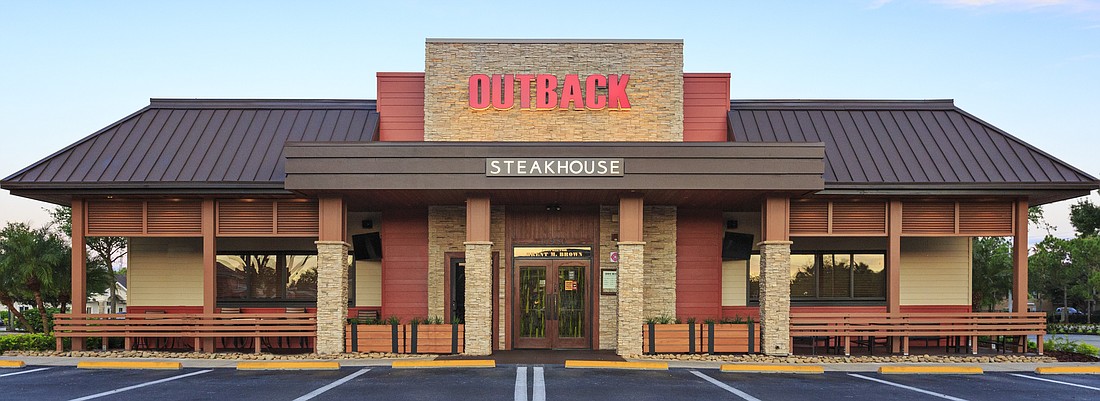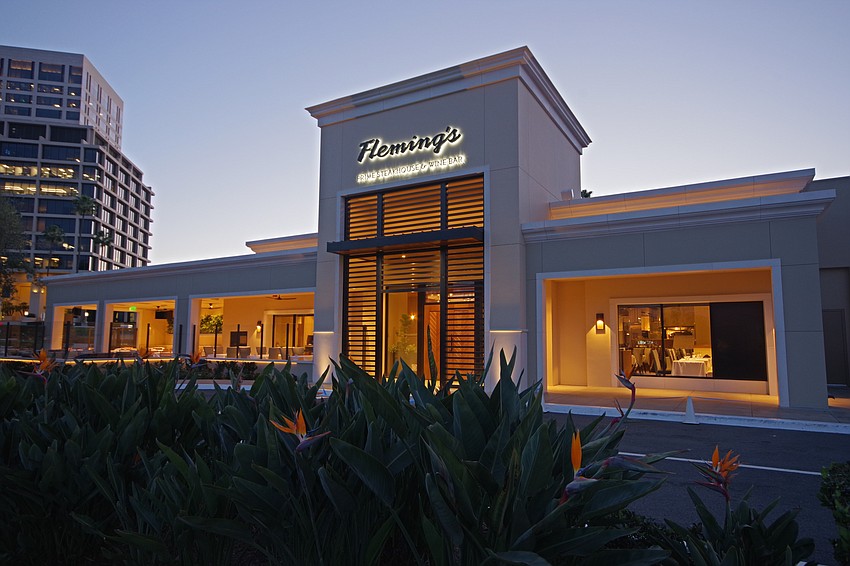- December 15, 2025
-
-
Loading

Loading

As Bloomin' Brands enters its 36th year doing business, the Tampa-based restaurant giant — owner of four major national brands — is having a bit of a midlife crisis.
The company, founded along Henderson Boulevard as a single Outback Steakhouse in 1988, is now a publicly traded conglomerate that runs Outback, Bonefish Grill, Fleming's Prime Steakhouse and Wine Bar, Aussie Grill and Carrabba's Italian Grill.
The challenge has been the bigger brands have changed little but the public certainly has. Diners now have more excuses to stay home and order meals from their mobile devices. Thus, Outback in particular suffers from this modern dilemma: How to increase foot traffic into the stores?
It's that problem — the decrease in traffic — that recently got Bloomin's stock downgraded by Raymond James, from the top score of "Strong Buy" to second place: "Outperform." (The next two ratings are "Market Perform" and "Underperform.")
"That's the key part of the story," says Brian Vaccaro, Raymond James managing director and equity analyst for restaurants. "Traffic."
Another angle in the company's future comes from Starboard Value, which is known for its aggressive "activist investing," especially in restaurants. Earlier in 2023, Starboard owned about 5% of Bloomin' stock. That's up to about 10% now, making it a Top 5 investor, according to the Wall Street Journal.
And it's enough stock and clout for Starboard to begin asking for big changes before Bloomin's annual meeting in April. Some changes have been made, not long after Starboard acquired 10% of Bloomin'. In August, Bloomin' put Rohit Lal on the board. Lal is logistics company Saia's EVP and chief information officer. The board also promoted director R. Michael Mohan, who has served on the board since 2017, to chair.

Much bigger changes are the least of what some might expect after Starboard's legendary struggle with Orlando-based Darden Restaurants in 2014. That was when Starboard caught the attention of investors and the media when it released hundreds of pages in a slideshow criticizing Olive Garden for giving away too many of its famous breadsticks, and for not putting enough salt into the water for the pasta.
In the end, Darden and Starboard worked things out and succeeded, at least by Wall Street standards. Darden's stock closed trading at $51.38 on Dec. 12, 2014. On Nov. 30, it opened the day at $155 per share.
There is no reason to believe Starboard has similar detailed plans for Bloomin'. Starboard, so far, merely released a shorter PowerPoint presentation on Bloomin' during an October meeting. It was considered a tame and reasonable set of expectations for Outback and its sister brands. It even suggested Bloomin' stock — it closed at $23.20 on Nov. 29 — was undervalued when compared to Darden.
But Starboard, too, noted the traffic problems. (Starboard did not return a message seeking comment.)
According to Raymond James' analysis of Bloomin' Brands' documents, Outback (the largest subsidiary of Bloomin') had a 6.1% decrease in traffic in the third quarter compared to the third quarter of 2023. That's as competitors LongHorn Steakhouse had a 1.5% increase, and Texas Roadhouse had a 4.1% jump.
Part of the reason for lessened traffic, some Bloomin' officials and industry observers believe, is the not the changes Outback has made in technology — servers now use a digital notepad to transmit orders faster — but the fade away from the fun, irreverence and happy culture the Australian-themed chain promised so effusively in the 1990s.
The ads from those days of bright shirts and Aussie accents used to promise: "No rules. Just right."
Bloomin' declined to comment for this story. But David Deno, Bloomin' CEO, addressed the issue Nov. 3, when he spoke to investors about third-quarter results. Revenues rose 2.3% from last year's third quarter, but analysts wanted to know when Outback traffic would improve.
"We'll be spending more on marketing and advertising in Q4 as well as 2024," Deno told investors and analysts. "Although we do not intend to return to pre-pandemic levels, we do believe a higher level of advertising spend is warranted moving forward. Utilizing a blend of television and high-return digital tactics, we believe our increased marketing presence can help build traffic."
Outback has already spent $83 million through the third quarter, and one analyst's guess is Outback is likely on target to spend more than $115 million on ads in 2023, up from $94 million in all of 2022.
Not every problem, such as inflation, is the fault of Bloomin', of course. For example, Bloomin' officials told investors beef production and related costs will remain a challenge.
"But look, anecdotally, outside of beef, things are looking pretty rational across the basket, which I think is a good sign," says Chris Meyer, Bloomin' SVP and CFO, speaking to investors Nov. 3. "Beef is a little bit of an unknown. We're still seeing the same information as everyone else out there."
Bloomin, meanwhile, has a history with activist investors.
Despite going public shortly after the 2008-09 recession ended, things looked good. Revenues initially climbed, peaking in 2014 at $4.44 billion. And then — a slow and steady decline. In 2018, Bloomin' grossed $4.13 billion.
Public criticism ensued before 2018 even ended, mostly from prominent investor Barington Capital Group.
CEO Liz Smith retired in March 2019 after 10 years. (In came David Deno, the former CFO.) At the end of 2019, Bloomin' reported an annual gross of $4.14 billion. That apparently displeased Bloomin' investors, which then included another activist investor, Jana Partners. Executive Chairwoman Smith, CEO from 2009 to 2019, was moved to the board.
Then, of course, came the pandemic. Revenue in 2020 fell to $3.17 billion.
But Raymond James' Vaccaro says through the pandemic, the company drove significant market expansion. And in 2021 and 2022, people clamored to get out of the house and into restaurants: Bloomin' Brands' revenues were $4.12 billion and $4.42 billion, respectively. With revenues bouncing back, the Bloomin' team proceeded to manage costs.
"The management team has done a nice job of streamlining (general and administrative costs)," says Vaccaro. "They've made good headway on de-leveraging their balance sheet ... They've strengthened the balance sheet and improved the profitability of the business."
So then why did Raymond James downgrade the stock? The answer is in the last six quarters.
"The Outback traffic was not what we were anticipating," says Vaccaro.
Get the latest business and commecial real estate news from Tampa Bay to Naples.